Leqembi approved in Japan, its first ex-US market

Eisai and Biogen now have their second regulatory approval for anti-amyloid therapy Leqembi – in Japan – as a treatment for slowing the progression of Alzheimer’s disease.
The green light for Leqembi (lecanemab) from the Ministry of Health, Labour, and Welfare (MHLW) comes after Eisai and Biogen’s marketing application was filed in January and given a priority review as a treatment for mild cognitive impairment (MCI) and mild dementia due to Alzheimer’s.
As a condition of approval, Eisai has agreed to conduct a post-marketing study that will monitor all patients treated with Leqembi until a certain number of cases are accumulated.
The aim is to test whether the benefits shown by the drug in clinical trials translate into a real-world setting and to keep an eye on its safety – particularly with regard to cases of brain swelling and bleeding seen with the drug.
Japan is a key world market for Leqembi, thanks to its ageing population, with around 37 million people expected to be over 65 by 2030. More than 4.5 million people in Japan are believed to have dementia caused by Alzheimer’s, compared to 6.5 million in the US, and this number is expected to rise significantly as the population ages.
Eisai's chief executive, Haruo Naito, said the approval makes Leqembi the first approved anti-amyloid Alzheimer’s treatment shown to reduce the disease progression rate and slow cognitive impairment in the early and mild dementia stages of the disease in Japan.
“We believe that we have turned a new page in the history of Alzheimer’s disease treatment,” he said, adding: “We are committed to delivering Leqembi to the people with early Alzheimer’s disease who need it and their families as a new treatment that removes the cause of the disease.”
Eisai is taking the lead on the registration of Leqembi around the world, with Biogen co-commercialising and co-promoting the drug. Eisai will be responsible for distributing it in Japan, its home market. It has also been filed for approval in the EU, China, Canada, Great Britain, and South Korea.
The Japanese approval comes a few weeks after Leqembi was granted full approval by the FDA in the US, having been awarded conditional approval at the start of 2023. A similar requirement for a registry of treated patients was imposed in the US as a condition of Medicare reimbursement.
The second regulatory approval is another boost to Eisai and Biogen’s ambitions in Alzheimer’s and the anti-amyloid class, which suffered as a result of the controversial approval and aborted rollout of Leqembi’s predecessor Aduhelm (aducanumab) in the US. That drug never got approval outside the US.
Leqembi is expected to grow slowly – in part as a result of the negative hangover in sentiment that surrounded Aduhelm’s approval on controversial data, but also due to logistical hurdles – yet, plenty of analysts are predicting it will eventually become a blockbuster with multibillion-dollar annual sales. Eisai itself is predicting that it will make $7 billion per year at its peak.
Take-up of the drug could be held up initially by the additional procedures involved in registry enrolment, as well as the need to test patients for the APOE4 gene mutation, as people with two copies of that are at elevated risk of side effects from the drug.













